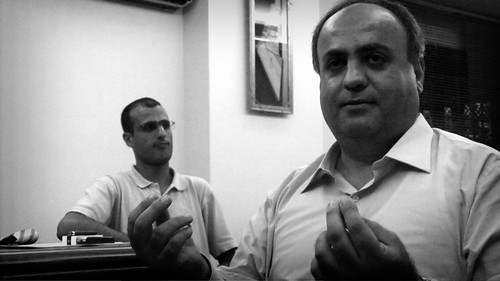WINEP at the helm of the pathetic agitprop caboose.Assad to Obama: Thanks but no thanks." ... Until last week, talks over Iraq-related regional security issues appeared to be a glimmer of hope in an otherwise bleak U.S.-Syrian engagement process. Washington has quietly asked Damascus over the last seven months to use its influence to promote reconciliation between Fatah and Hamas. Following the most recent visit to Damascus by U.S. Mideast envoy George Mitchell, Syria, along with Turkey and Egypt, pressed Hamas to allow Fatah members in Gaza to attend their party's conference earlier this month -- an important first step in forming a united Palestinian position. It didn't happen.
Damascus instead took credit for an alternative "breakthrough" -- Hamas' recent announcement that it would accept and respect the 1967 border between Israel and the Palestinians in return for Israel's conceding Palestinians the right of return and allowing the establishment of a Palestinian capital in East Jerusalem. .......On peace talks with Israel, Damascus continues to demand that Israel commit to withdrawing from the Golan Heights to the line of June 4, 1967, and resume Turkish-sponsored indirect talks from where they left off last December. Israel, which favors direct negotiations without preconditions under U.S. auspices, has refused.
French efforts last year to coax Damascus to open an embassy in Beirut and appoint an ambassador there led many to speculate that Damascus was willing to turn a new page with its western neighbor, Lebanon. But Syria's ambassador to Beirut spends most of his time in Damascus, and statements on Lebanon are put forward by pro-Syrian Lebanese politicians such as Wiam Wahhab who, due to his role in helping Damascus call the shots in Lebanon prior to Syria's 2005 withdrawal, has earned a reputation as one of Syria's last unquestioning proxies in Lebanon. Following the defeat of Syria's allies in Lebanon's June 7 elections (despite intensive Syrian efforts to swing the poll Syria's way), Damascus and its allies have stymied the formation of a government by the pro-independence March 14 block. Meanwhile, an interview Aug. 25 in the Lebanese daily An-Nahar with a senior U.S. official (see the never-disappointing Feltman) made apparent Washington's frustration with Syria, most notably its smuggling to Hezbollah of increasingly advanced weaponry across the Lebanese-Syrian border, which Damascus still refuses to demarcate despite promising to do so.
Concerning relations with Iran, on Aug. 19 (the same day as the Iraqi attacks) Assad ..... meant that "Iran and Syria must continue the regional policy as in the past." The visit, combined with short-range missile developed by Syria, Iran, and North Korea, shows Damascus remains firmly ensconced in the Iranian-led "resistance axis."....
This is because the actual problem of fighters entering Iraq has less to do with security arrangements along the border and more to do ....Syria is unwilling to cut them off over fears of risking domestic attacks. In short, Damascus wants high-level U.S. engagement without making hard sacrifices.
During the 1970s and 1990s, when the United States tried ultimately unsuccessful policies of "constructive engagement" with Damascus, Washington would have allowed Syria to skirt the issue and quietly deal with the issue from "behind the scenes." But last week's blasts and other jihadi attacks originating out of Syria this year show that giving Damascus a pass on the issue allows the Assad regime to keep its hand on the foreign-fighter tap. This leaves the strategic initiative in Damascus' hands to use as leverage as the United States withdraws from Iraq. U.S. support for its Iraqi allies to roll back the fighters are likely to remain Washington's safest bet...."


1 comment:
It is amazing how American Zionist hoodlums sound exactly like Hariri hoodlums.
Post a Comment